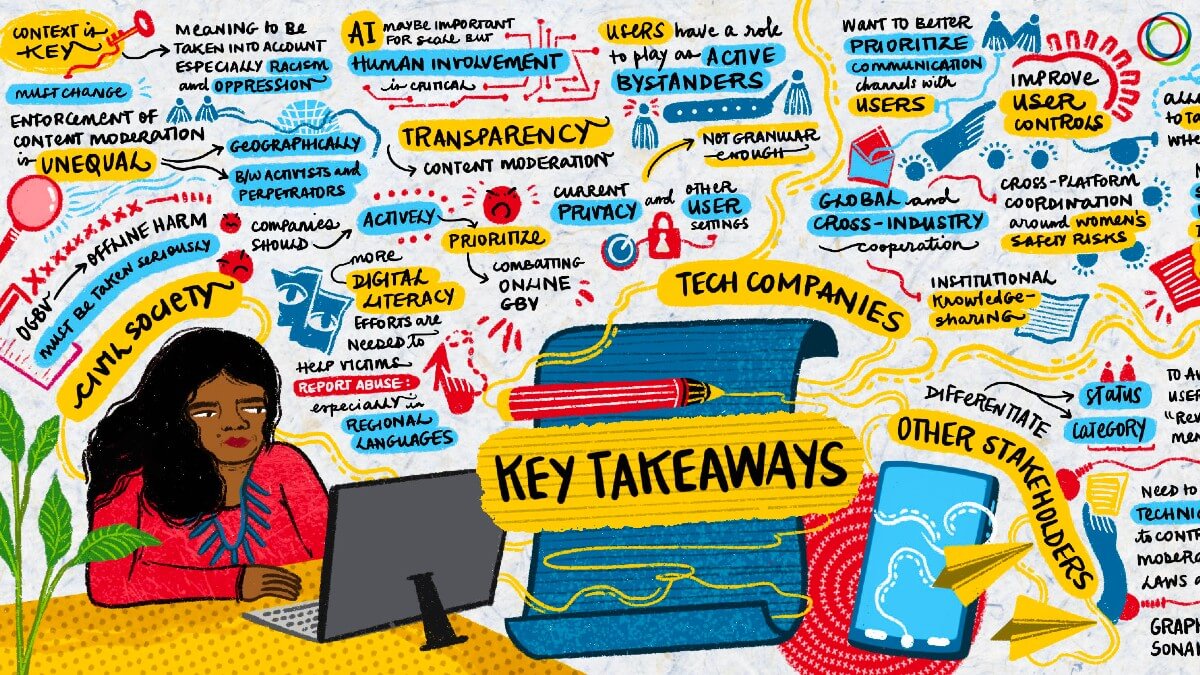Violence against women (VAW) in politics, especially if committed under the veil of online anonymity, is taking a serious toll on women’s mental health. Such abuse affects women in all branches of government and may take many forms – from spreading gender-based disinformation and deepfakes to doxing and sexualization. Consequently, some victims choose to limit their public appearances, resign from their posts, or leave politics altogether. Amnesty International’s 2018 #ToxicTwitter report discusses numerous cases of online abuse against women politicians, journalists, and activists and the negative effect it had on their well-being, life, and work.
Experts usually distinguish between physical, sexual, psychological/emotional, economic, and symbolic/semiotic as forms of violence woman experience. Psychological/emotional and symbolic/semiotic violence are especially relevant when we focus on women in politics and their online presence. A 2016 study reports that out of 55 women members of Parliament (MPs) from 39 countries, 81.8 % ‘have experienced some form of psychological violence’, including threats of rape, death, kidnapping and sexist insults. On the other hand, symbolic/semiotic violence includes ‘symbolic acts, sexualized language or images, gendered disinformation, or moral questioning intended to harm women’s representation, voice and agency in politics’.
According to the IPU survey, ‘most psychological attacks were made in parliament by male colleagues or on social media’. Violence dissipated through social media is hardly a surprise, as it often becomes the breeding ground for bots, trolls, incels, engaging in astroturfing, doxing, sextortion and non-consensual porn. However, social media is mostly a reflection of what is already occurring in everyday life and interpersonal communication. A significant portion of online gendered disinformation and hate speech originates from political opponents, media, even party colleagues. According to OSCE, the environment within political parties is especially conducive to structural violence due to stricter hierarchy, more authoritarian structures, and unequal power relations. A NDI study found that the perpetrators of VAW in politics ‘were mainly male fellow party members (54.3%), followed closely by party leadership (45.7%)’, while the violence came in the form of ‘psychological attacks, including threats and coercion (48%) and economic violence (36%). Worryingly, a 2018 study demonstrated that ‘…female MPs active in the fight against gender inequality and violence against women were often singled out for attack’. Women belonging to and/or working with marginalized groups are more likely to be abused – not only for their sex and gender, but also for their political and social views.
Constantly intertwined and amplified in the digital dimension, stereotypical notions and clichéd representations of women may cause suffering, pain, and might lead to dire consequences. AI reports that women abused on social media platforms experience ‘stress, anxiety, panic attacks, powerlessness and loss of confidence’. Mona Lee Krook reminds that psychological violence ‘seeks to disempower targets by degrading, demoralizing, or shaming them – often through efforts to instill fear, cause stress, or harm their credibility’. A female Mexican activist vividly describes the more ‘physical’ effects of abuse, such as ‘increasingly high levels of stress, fatigue, depression, anxiety, migraines’. Elsewhere, women politicians shared that abuse led to a decision to end their political career, to stress, fear, isolation, sadness and anger, decreased ability to perform duties and express political views, strengthened motivation to continue working as an MP and/or a politician, becoming more belligerent and prepared to face perpetrators open.
However, there are specific policy options that should be considered in order to mitigate this crisis. Although content moderation on social platforms is not a panacea, this should be highly encouraged among online services. Recently, the European Union took a step towards greater regulation with the adoption of the Digital Services Act to ‘create a safer digital space…by imposing stricter content moderation on social media platforms and placing obligations on digital service providers regarding online harms’. In 2022, #ShePersisted published the informative Digital Resilience Toolkit for Women In Politics – a collection of resources for digital security and tactics for preventing and handling online harms. The 2022 OSCE Toolkit recommends ways to curate and moderate content, collect evidence, report abuse, and design counter-campaigns. It advises on what colleagues of women politicians can do to prevent violence and support its victims. Therefore, it is important to continue organizing public awareness-raising campaigns that rely on simple, but powerful messages and advise on ways to respond to and report cases of violence. It is essential to adopt legislation and strategic documents, which promote and foster gender equality and propose concrete measures to eradicate harmful gender stereotypes through education, training, and digital and media literacy initiatives. Comprehensive Ethical Codes should be adopted within political parties and government structures, and compliance with them should be carefully monitored and evaluated. Importantly, women in politics, and especially those who have experienced abuse, should be involved in the crafting of all measures, initiatives, and policies countering this malicious phenomenon. Further in-depth research on gender-based violence and gendered disinformation should be encouraged and the translation of research findings into policy should be facilitated and supported by all relevant stakeholders.
Engaging colleagues, men, and society in efforts to eliminate gendered online abuse is paramount. Such efforts should go beyond regulation, content moderation, new online safeguards and reporting mechanisms, and improved digital literacy. They should seek to eradicate negative stereotypes towards women and marginalized groups, thus helping to abolish structural discrimination and centuries-old power structures and give women more voice and agency.
This cannot be realized without engaging the entire society. For some of us, it will mean relinquishing convenience and realizing that certain ways of doing things belong to the past. For others, it will mean being brave enough to choose anguish over silence.
